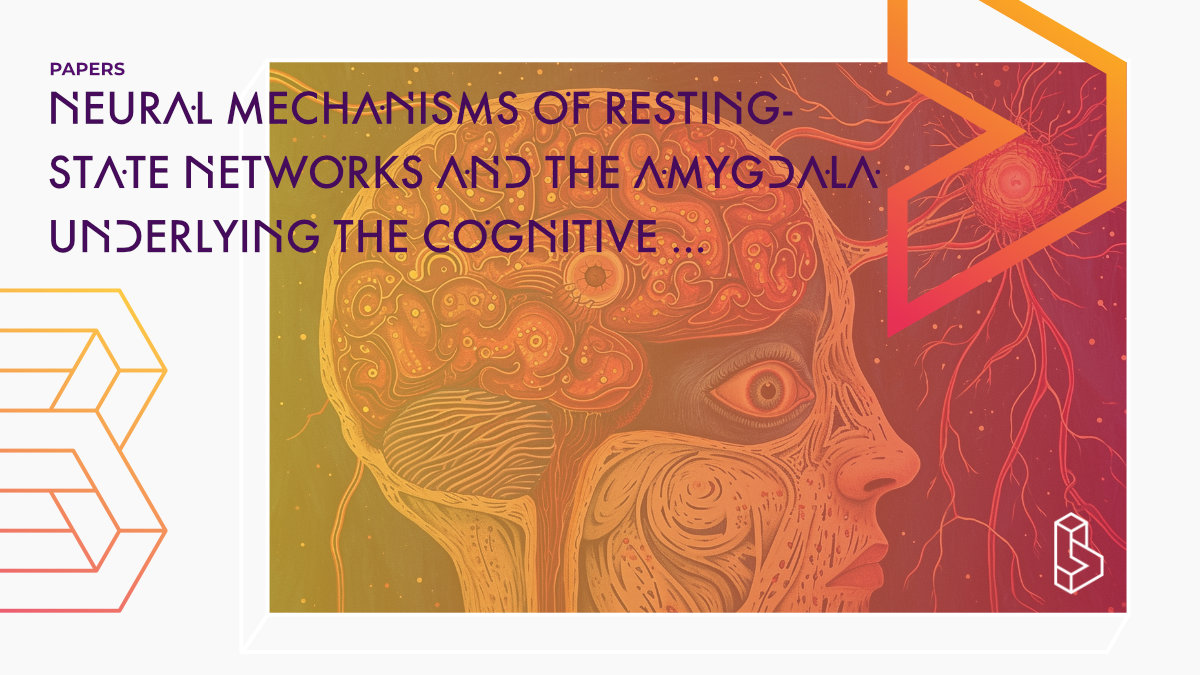This follow-up fMRI analysis of an RCT of healthy subjects (n=24) finds that psilocybin (15mg/70kg) led to a pattern of decreased top-down effectivity between the default mode network (DMN), salience network (SN), and central executive network (CEN) to the amygdala.
Abstract of Neural Mechanisms of Resting-State Networks and the Amygdala underlying the Cognitive and Emotional Effects of Psilocybin
“Classic psychedelics alter sense of self and patterns of self-related thought. These changes are hypothesised to underlie their therapeutic efficacy across internalising pathologies such as addiction, anxiety, and depression. Using resting-state functional MRI images from a randomised, double blinded, placebo-controlled clinical trial of 24 healthy adults under 0.215mg/kg psilocybin, we investigated the effective connectivity changes between the amygdala and the default mode network (DMN), salience network (SN) and central executive network (CEN). This connectivity underpins the appraisal and regulation of emotion and is associated with clinical symptomatology. We observed a general pattern of decreased top-down effective connectivity from the resting state networks of interest to the amygdala and directed connectivity changes associated with altered emotion and meaning under psilocybin. Our findings identify cognitive-emotional connectivity associated with the subjective effects of psilocybin and the attenuation of the amygdala as a potential biomarker of psilocybin’s therapeutic efficacy.”
Authors: Devon Stoliker, Leonardo Novelli, Franz X. Vollenweider, Gary Egan, Katrin H. Preller & Adeel Razi
Summary of Neural Mechanisms of Resting-State Networks and the Amygdala underlying the Cognitive and Emotional Effects of Psilocybin
The authors used functional MRI resting state images to estimate the directed changes between the amygdala and three large-scale resting-state networks involved in cognition. They found that effective connectivity between the default mode network and the amygdala decreased under the influence of psilocybin.
Psilocybin, a serotonergic psychedelic, is the main psychoactive compound found in numerous species of mushrooms that have been used to alter consciousness throughout history in religious and medicinal rituals. It can cause powerful changes to self and subjective experience, including feelings of well-being, changes in self-awareness, visual hallucinations, and a sense of transcendence of time and space.
Psilocybin affects brain connectivity with the amygdala, a region involved in processing emotional significance and regulating arousal in response to stimuli, including physical threats and challenges to beliefs. These findings suggest the neural mechanisms underlying psychedelic subjective experiences may be markers of therapeutic outcomes. Empirical investigations of amygdala response under psychedelics have focused on emotional stimuli. Psilocybin has been shown to reduce response to fearful stimuli, and to increase positive and decrease negative affect lasting up to one month.
Find this paper
https://doi.org/10.1016/j.biopsych.2024.01.002
Open Access | Google Scholar | Backup | 🕊
Cite this paper (APA)
Stoliker, D., Novelli, L., Vollenweider, F. X., Egan, G. F., Preller, K. H., & Razi, A. (2024). Neural Mechanisms of Resting-State Networks and the Amygdala underlying the Cognitive and Emotional Effects of Psilocybin. Biological Psychiatry.
Study details
Compounds studied
Psilocybin
Topics studied
Healthy Subjects
Study characteristics
Original Re-analysis
Placebo-Controlled
Double-Blind
Randomized
Re-analysis
Bio/Neuro
Participants
24
Humans
Authors
Authors associated with this publication with profiles on Blossom
Franz VollenweiderFranz X. Vollenweider is one of the pioneering psychedelics researchers, currently at the University of Zurich. He is also the director of the Heffter (sponsored) Research Center Zürich for Consciousness Studies (HRC-ZH).
Katrin Preller
Katrin Preller is one of the upcoming researchers, currently at the University of Zurich and Yale University, and is focused on the neurobiology and pharmacology of psychedelics.
Compound Details
The psychedelics given at which dose and how many times
Psilocybin 15 mg | 1xLinked Research Papers
Notable research papers that build on or are influenced by this paper
International pooled patient-level meta-analysis of ketamine infusion for depression: In search of clinical moderatorsThis meta-analysis (n=809, s=17) finds robust effects of ketamine for relieving depression (at 24 hours and seven days). Moderators of this effect were the level of treatment resistance (i.e. more failed SSRIs) and studies that used a cross-over design (smaller placebo effect). Other moderators were found, but all were modest and clinically irrelevant (i.e. age or sex doesn't moderate treatment effect).
Linked Clinical Trial
Beyond the Self and Back: Neuropharmacological Mechanisms Underlying the Dissolution of the SelfThe aim of the study is to identify neural signatures, behavioral and phenomenological expressions of self-related processes including: sense of agency, semantic distinction between self and other, selflessness (altruism), social agency, embodied self (interoception), perceptual functioning of dissolved self including hallucinations and crossmodal processing, and finally the mystical type dissolution of the self.

